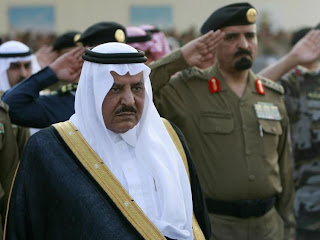Nayef bin Abdul Aziz Al Saud, also spelled Naif, (Arabic: الأمير نايف بن عبد العزيز آل سعود) (1933-) is the Crown Prince (as of October 27, 2011), First Deputy Prime Minister and long time Minister of Interior of Saudi Arabia. He is a half-brother of King Abdullah. He is one of the five surviving members of the Sudairi Seven.
Early life and education
Nayef was born in Taif in 1933. He received his education at "The Princes School" and at the hands of senior ulema (religious leaders). In addition, he has read widely in politics, diplomacy, and security.
In 1953, at the age of 20, he became Governor of Riyadh. From 1954 to 1970, he served as Deputy Minister of the Interior. In 1970, King Faisal promoted him to Minister of State for Internal Affairs
Minister of Interior
Timeline : In March 1975, King Faisal's assassination made then-Minister of Interior Prince Fahd Crown Prince. Nayef replaced Fahd as Minister of Interior.
In December 1994, he ordered hundreds of terrorism-related arrests with the support of Prince Turki, head of Saudi intelligence services.
In November 2001, he issued all women in Saudi Arabia identity cards. Women were previously registered under their husband's or father's name.
In April 2001, he, not Foreign Minister Saud al Faisal, went to Iran as Saudi envoy in an unprecedented move.
After the September 11 attacks, he received U.S. criticism for not undertaking sufficient action against extremists.
In July 2003, Senator Charles Schumer lobbied through Prince Bandar to remove Nayef as Minister of Interior.
Between 2003 and 2006, he led Saudi's confrontation against al Qaeda, which sponsored a series of domestic attacks on expatriate housing compounds, oil infrastructure, and industrial facilities. His political stance was strengthened because of increased media exposure and the successful end to terrorist attacks.
In March 2011, during the 2011 Saudi Arabian protests, 200 people who called for more information on their imprisoned relatives were denied a meeting with Nayef.
Influence : He had members of the Ministry of Interior placed in all overseas embassies.
His career was propelled by his full-brother King Fahd. Under Fahd, the Ministry of Interior became one of the most influential bureaucracies in Saudi Arabia. He served as a mediator in disputes between Fahd and Sultan. As Fahd's health deteriorated, his power gradually diminished as well. However, Nayef is currently the most influential of the Sudairi Seven. He has delegated the day-to-day responsibilities of his ministry to Deputy Minister Prince Ahmed and to his son, Prince Muhammad.
In 2003, he "threatened to cancel certain business deals with the French government" if the narcotics investigation of Prince Nayef bin Sultan bin Fawwaz al-Shaalan continued.
When meeting with US diplomats in 2009, he voiced support for aggressive activity against Iran after what he believed was a breach of the 2001 security agreement. He urged European nations to hand in terrorist suspects and asked for U.S. intercession. He said the most effective way to combat extremism was through Friday sermons.
Recent positions and succession to the throne
In March 2009, Nayef became Second Deputy Prime Minister. It caused a rare public split in the royal family. Prince Talal called on the King to clarify that the appointment did not necessarily mean that Nayef would become Crown Prince. The appointment expanded his influence into all corners of Saudi domestic policy and allowed him to partake in the development of foreign policy. He is not expected to interfere in economic matters, but may influence the judiciary.
He chaired many cabinet meetings when Abdullah and Sultan were away for health reasons.[4] Critics said he was behind the cancellation of the nation's only film festival in the summer of 2009. In November 2010, he undertook all Hajj-related responsibities. In some government offices, his picture was added next to Abdul-Aziz, Abdullah and Sultan.
According to leaked cables, he advocated a tougher approach than King Abdullah towards Yemeni President Saleh in 2009.
He was appointed Crown Prince of Saudi Arabia and First Deputy Prime Minister by his half-brother King Abdullah on October 27, 2011, five days after the death of his brother, Crown Prince Sultan.
Personal life
He has been active in philanthropy to Palestinians, Indonesians and Pakistanis.
He is said to be suffering from diabetes mellitus and osteoporosis.
From : www.wikipedia.org




